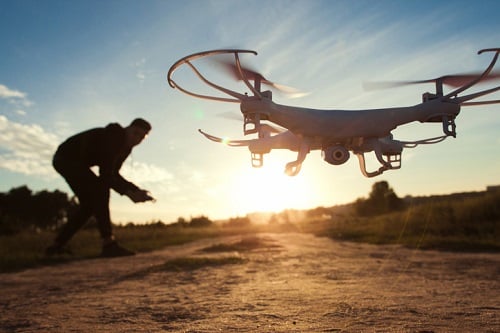

When you hear the word drone, the first thing that comes to mind may be the dreaded Gatwick Airport shutdown, or covert military operations using versions of the aircraft that are worth hundreds of thousands of pounds.
But what you may not know is that drones are being used in a multitude of industries, including insurance, and it’s transforming the landscape of the entire world.
Ecclesiastical Insurance, best known for its expertise in the areas of heritage, faith and charity, is one company in the sector that has started drone trials.
Ecclesiastical has been using drones for surveying as part of its risk management service, and the results have been extremely promising according to risk management director Mark Matthews.
“The drone technology is a natural extension to the work that our surveyors will do on site, particularly with those large more complex locations in the heritage, the faith and the education space,” Matthews explained.
Using the drones, Ecclesiastical says it can get a closer look at buildings that are hard to access, which allows better risk management assessment and advice.
Many of the buildings in the company’s profile are large churches, historical buildings or schools, which makes traditional surveying methods costly or difficult for parts of the properties. Using a drone, however, Ecclesiastical can access all parts of the property and visualise all areas.
“We see two main areas in how the drone trial complements the work our surveyors do,” Matthews said. “One is the up-close condition inspection you conduct using the photographic and video evidence, and another is photogrammetry.
“Photogrammetry is essentially 3D modelling you can get from the data - so we can get some very accurate modelling data to complement our services.”
According to Paul Franklin, who has been working on Ecclesiastical’s drone trials, the science is quite simple.
“Photogrammetry is where a drone takes a series of images of a building, with overlap,” Franklin said.
“These images are fed into a program where the software relates the individual pixels to a point in space and time and will allow the software to build a 3D digital model of that building. That model is millimetres accurate.”
So far, the company has used the technology on four sites, with more planned. Two of the places where the drones have been used are significant historical sites - Worcester Cathedral and Blenheim Palace.
“We’ve used the technology with Blenheim Palace, which is one of the nation’s landmarks,” Matthews said. “We’re intending to deploy this quite extensively across our historic houses, stately homes, castles, palaces, etc.”
As for the future, Matthews said that the drone technology means that they could replace some surveyors with drones in the future.
“Looking over the longer term we’re looking at a data grab at this moment in time, but I guess when it comes to five, seven, 10 years down the line when you’re doing your traditional resurveys it’s going to make that far more efficient,” Matthews said.
“You’ll be able to identify immediately with the photogrammetry what has changed and that might reveal some interesting risk insights. Over the longer term I think we can probably see ourselves, perhaps at the time of resurveying, and this might be controversial, but we might not actually need to put a surveyor on the ground.
“There is a massive network of approved drone contractors in the market now - if they can supply up to date data to us, of our sites, then we could potentially negate the need for some revisits. If you do have local drone contractors who can do that data capture for you, then you might be able to conduct remote survey without putting an expensive surveyor on the ground.”
